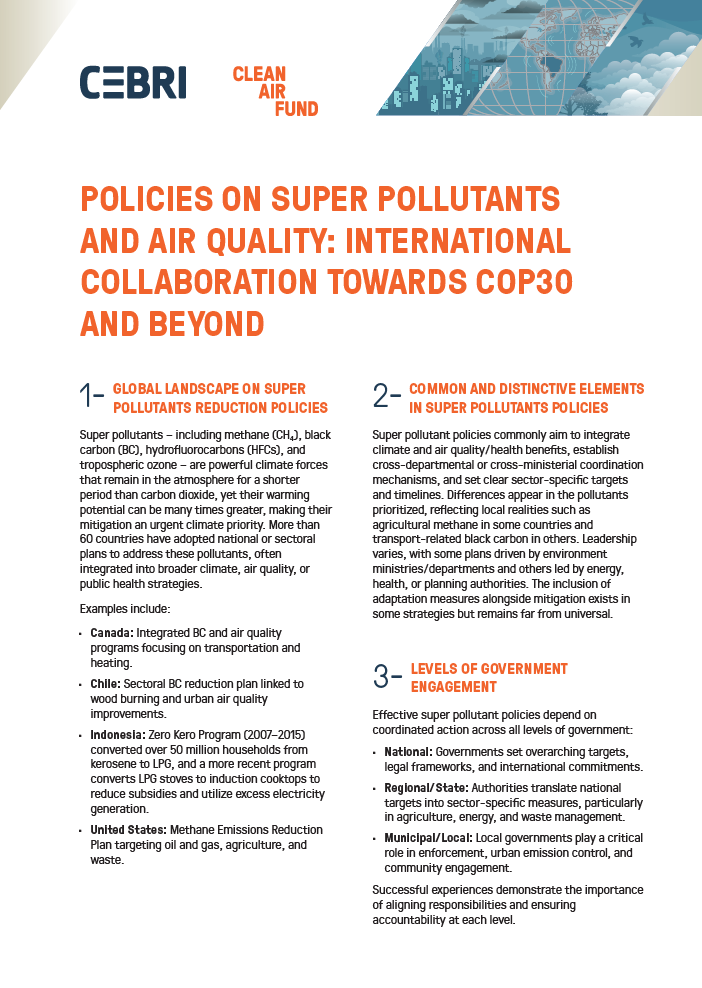Reports
Policies on super pollutants and air quality: International collaboration towards COP30 and beyond
- 06 october 2025
This factsheet contributes to the roundtable “Advancing Super Pollutant Reduction Policies Towards COP30”, which brings together leaders from Brazilian ministries and international delegations to discuss the importance of policies aimed at tackling super pollutants (or Short-Lived Climate Pollutants – SLCPs, such as black carbon, tropospheric ozone, and methane), sharing international experiences in this field and exploring opportunities for cooperation at COP30 and beyond. The document outlines global policies for super pollutant reduction and highlights opportunities for Brazil to integrate climate, health, and air quality actions in the lead-up to COP30.
Topics Covered:
- Global Landscape of Super Pollutants Reduction Policies
Examples of policies in Canada, Chile, Indonesia, and the United States. - Common and Distinctive Elements in Super Pollutant Policies
Integration of climate, health, and air quality agendas; variations by country and sector. - Levels of Government Engagement
Coordinated actions across national, regional/state, and municipal/local governments. - Benefits of an Integrated Approach
Climate, health, energy, and economic advantages. - Global Success Cases in Black Carbon Reduction
Initiatives in Nordic countries, Chile, India, and Indonesia. - Promising Areas for COP30 Negotiations
Opportunities for Brazil to lead with its forthcoming National Plan on Super Pollutants.
ABOUT THE CLEAN AIR FUND & CEBRI COLLABORATION
Clean Air Fund and CEBRI are collaborating to raise awareness of the importance of integrating air pollution into climate discussions at COPs and beyond. The aim is to highlight the impacts of super pollutants on human health, the environment, and the economy, and to discuss ways to tackle the issue.
Discover all the initiatives of the project HERE.
This factsheet contributes to the roundtable “Advancing Super Pollutant Reduction Policies Towards COP30”, which brings together leaders from Brazilian ministries and international delegations to discuss the importance of policies aimed at tackling super pollutants (or Short-Lived Climate Pollutants – SLCPs, such as black carbon, tropospheric ozone, and methane), sharing international experiences in this field and exploring opportunities for cooperation at COP30 and beyond. The document outlines global policies for super pollutant reduction and highlights opportunities for Brazil to integrate climate, health, and air quality actions in the lead-up to COP30.
Topics Covered:
- Global Landscape of Super Pollutants Reduction Policies
Examples of policies in Canada, Chile, Indonesia, and the United States. - Common and Distinctive Elements in Super Pollutant Policies
Integration of climate, health, and air quality agendas; variations by country and sector. - Levels of Government Engagement
Coordinated actions across national, regional/state, and municipal/local governments. - Benefits of an Integrated Approach
Climate, health, energy, and economic advantages. - Global Success Cases in Black Carbon Reduction
Initiatives in Nordic countries, Chile, India, and Indonesia. - Promising Areas for COP30 Negotiations
Opportunities for Brazil to lead with its forthcoming National Plan on Super Pollutants.
ABOUT THE CLEAN AIR FUND & CEBRI COLLABORATION
Clean Air Fund and CEBRI are collaborating to raise awareness of the importance of integrating air pollution into climate discussions at COPs and beyond. The aim is to highlight the impacts of super pollutants on human health, the environment, and the economy, and to discuss ways to tackle the issue.
Discover all the initiatives of the project HERE.

